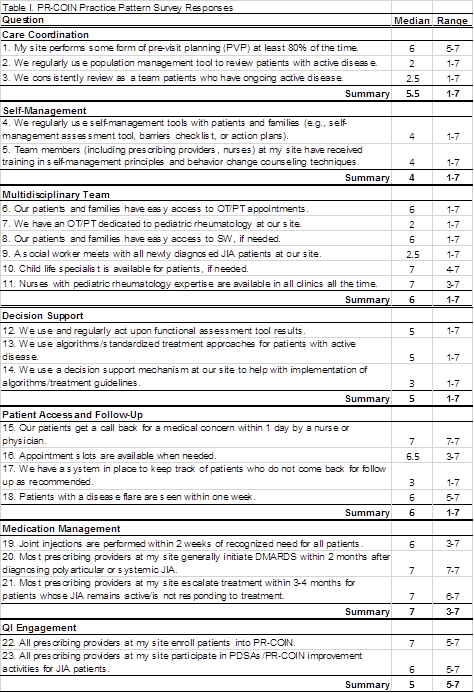Session Information
Date: Tuesday, November 7, 2017
Title: Pediatric Rheumatology – Clinical and Therapeutic Aspects Poster III: Juvenile Arthritis
Session Type: ACR Poster Session C
Session Time: 9:00AM-11:00AM
Background/Purpose: Despite modern treatment options for patients with juvenile idiopathic arthritis (JIA), rates of clinical inactive disease (CID) remain low. The Pediatric Rheumatology Care and Outcomes Improvement Network (PR-COIN) includes 18 centers that serve as a representative sample for current practice. Results from the PR-COIN registry have demonstrated marked center-to-center variability in the rate of CID. The objective of this study was to survey PR-COIN centers to assess JIA practice patterns that may account for CID variation.
Methods: A survey was distributed to PR-COIN centers in October 2016 that consisted of 23 Likert items with a 7-point scale ranging from “totally disagree” = 1 to “totally agree” = 7. Practice patterns were defined as “standard methods of how care is conducted” within the local rheumatology clinic or division. The items represented evidence and consensus-based factors both specific to JIA management and adapted from chronic illness models. All items were constructed using declarative statements in the positive direction. For the analysis, the 23 items were grouped into 7 domains, including prepared proactive team, self-management, multidisciplinary team, decision support, patient access and follow-up, medication management, and quality improvement (QI) engagement. Statistical analyses included descriptive statistics for the results across individual items and summarized within domains.
Results: A total of 10 PR-COIN centers completed the practice pattern survey with a single set of responses per center. The median and range of each item and domain were calculated (Table I). A diverging stacked bar chart was constructed to illustrate the frequency of Likert responses within each item (Figure 1). Overall, the results demonstrate substantial variation in responses both across items and within items. Two items demonstrated total agreement and 5 additional items demonstrated all positive responses. However, the remaining 16 items demonstrated a wide range of responses and 12 items included at least one center that answered “totally disagree”.
Conclusion: We identified wide variation in JIA practice patterns among centers that participate in the PR-COIN network. These initial results are critical for targeting future quality improvement interventions across the network as well as launching additional investigations into the specific practices that are associated with higher rates of CID. Next steps will include semi-structured interviews with the PR-COIN centers to better characterize modifiable factors and develop a best-practice JIA bundle.
To cite this abstract in AMA style:
Smitherman EA, Taylor J, Morgan EM, Bingham CA. Utilizing the Pediatric Rheumatology Care and Outcomes Improvement Network to Assess Practice Pattern Variation in Juvenile Idiopathic Arthritis [abstract]. Arthritis Rheumatol. 2017; 69 (suppl 10). https://acrabstracts.org/abstract/utilizing-the-pediatric-rheumatology-care-and-outcomes-improvement-network-to-assess-practice-pattern-variation-in-juvenile-idiopathic-arthritis/. Accessed .« Back to 2017 ACR/ARHP Annual Meeting
ACR Meeting Abstracts - https://acrabstracts.org/abstract/utilizing-the-pediatric-rheumatology-care-and-outcomes-improvement-network-to-assess-practice-pattern-variation-in-juvenile-idiopathic-arthritis/


